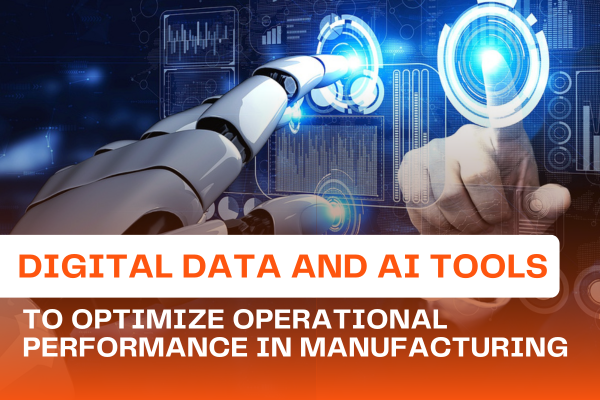
Digital Data and AI Tools to Optimize Operational Performance in Manufacturing
Artificial intelligence is revolutionizing the manufacturing industry in many ways. The adoption of Industry 4.0 to digitalize manufacturing and operational processes can boost sales, profits, and customer experience.
Statistics show that the global AI and manufacturing market is estimated to grow at a CAGR (compound annual growth rate) of 33.5% from 2023 to 2032 to touch $68.36 billion by 2032. Another report shows that AI can increase production by at least 40% by 2035. Maintenance and quality control are currently the two primary reasons manufacturers are investing in artificial intelligence.
However, AI technology can help the industry in several ways. Here, we’ll discuss how digitalizing data and using AI tools can effectively optimize operational performance in the manufacturing sector.
The Need for Digital Transformation in Manufacturing
Digital technologies like artificial intelligence, advanced analytics, the Internet of Things (IoT), etc., help manufacturers unlock the endless potential of data, identify new growth opportunities, minimize risk, and enter emerging markets. Digital transformation turns static processes agile and makes a manufacturing unit flexible enough to adapt to the changing market conditions and customer expectations.
In short, digital transformation empowers a manufacturer to streamline operations, shorten the production cycle, optimize resources, improve quality control, enhance operational efficiency, build better supply chains, accelerate distribution, and increase customer experience.
However, digitally transforming a factory or enterprise is a continuous and lengthy process. It requires a comprehensive understanding of the business and market. Manufacturers can partner with B2B companies to adopt AI tools in their enterprises. For example, partnering with Trumould Injection Molding Company helps manufacturers create customized and high-quality products using advanced equipment.
Popular AI Tools and Technologies in the Industry
Robotics and Automation : Robotics and automation have a crucial role in modern manufacturing. Automation saves time and resources by letting AI tools take over recurring tasks. It reduces the need for human intervention and allows workers to focus on the core aspects of their jobs instead of repeating the same actions multiple times. Robotics can increase precision and accuracy as well as productivity. Together, they can speed up production without compromising quality.
Warehousing Software : Also known as a warehouse management system (WMS), the software is widely used in the manufacturing and supply chain industries to streamline inventory management, warehousing processes, and deliveries. The software can be hosted on-premises or run on a cloud platform. Many vendors offer SaaS (software as a service) solutions to deploy, customize, maintain, and upgrade the warehousing software for the enterprise. A manufacturer can get real-time updates about raw materials and products in their various stages stores in the warehouses.
Business Intelligence : Business intelligence is a suite of technologies and processes used to collect, store, and analyze large volumes of data to make effective decisions. BI combines artificial intelligence, data analytics, IoT, cloud computing, etc., to create smart factories with greater flexibility, scalability, agility, and adaptability. It plays a vital role in turning a traditional manufacturing unit into a smart manufacturing enterprise with the ability to make proactive decisions.
Internet of Things : IoT or Internet of Things is a system where multiple data-collecting devices are installed at the machines and connected in a network. The IoT devices share real-time data collected from the machines. This data is analyzed using different data analytical methods and tools. The insights are derived in real-time and provide detailed reports about the machines’ efficiency, production, etc. The data from IoT devices is used to run predictive analytics, which helps in planning predictive maintenance and optimizing resources. It reduces unexpected breakdowns and delays.
MUD Technology in Injection Molding : MUD technology, also called the Master Unit Die Quick-Change (MUD) system, is gaining popularity in injection molding. It is an interchangeable modular mold base system where different frame types and sizes come with endless interchangeable molds. Using MUD technology, the manufacturer can insert or replace the molding plates and continue production without stopping the entire process to change the spare parts.
The technology increases productivity and reduces tooling costs, which ultimately leads to lower production costs. Trumould Injection Molding Company uses this technology to complete more projects in less time and offers multiple customizable options to enterprises.
Autoqouting in Injection Molding : Autoquoting is an advanced algorithm developed by the experienced in-house team at Trumould. It is an intuitive interface where manufacturers can provide input details about their requirements and get an immediate quote for the project. In the traditional method, the manufacturer has to wait for anywhere between a week and three to get a quote. With autoquoting, this waiting time is eliminated completely. Moreover, the interface allows manufacturers to customize the input details and get multiple quotes. The algorithm also includes technical feedback about the product design. Additionally, there’s an option to get the design evaluated by experts to ensure its accuracy.
Reasons to Invest in Digital Data and AI Tools in Manufacturing
But why should the manufacturing industry invest in digital data and artificial intelligence? How can technologies like machine learning, automation, robotics, IoT, edge computing, smart manufacturing, etc., help the sector become stronger and better? Let’s find out below.
Better Quality Control : There’s no point in increasing production if the final products don’t clear quality checks. AI technology also helps in maintaining and improving product quality by indicating the potential defect in a product. In fact, a report by Statista shows that 59% of manufacturers use artificial intelligence for quality control.
Production Agility : Today’s customers are not happy with limited selections and stock designs. They prefer personalized products and more variety to choose from. Achieving such production agility without increasing costs is not possible unless the manufacturer uses the latest technology. For example, MUD technology helps create more varied parts through injection molding for the same cost and within the same duration.
Predictive Maintenance : Predictive maintenance is the most important aspect of smart manufacturing. The last thing an enterprise wants is an unexpected equipment breakdown, which disrupts the entire production cycle. Predictive analytics use the data provided by IoT devices to determine when a machine needs maintenance. These sessions can be scheduled during off days so that the production period continues to be free of disruptions. It also helps detect minor issues in the equipment and repair them before they cause greater damage.
Optimizing Operations : Automation, robotics, better communication, data-driven decision-making models, etc., can optimize factory operations and increase efficiency to manufacture more products in less time using fewer resources. This will reduce the working capital and costs, allowing manufacturers to create more products for a lesser investment.
Smart Factory Revolution : Adopting digital technologies empowers the manufacturer to revolutionize the concept of the factory by creating a robust and interconnected environment. This streamlines the data flow within the factory and helps drive real-time actionable insights to make faster and more effective decisions. A smart factory is always ready to adapt to the changes and satisfy customer requirements.
Higher Customer Satisfaction : The markets have changed from being product-centric to customer-centric. Manufacturers should consider customer preferences when developing new products. From product research to transparency in the supply chain and after-sales customer service, all aspects can be effectively handled by using insights from data analytics. Customer analytics provide in-depth insights about what customers want from a business.
Enhance Value Chain : Artificial intelligence tools can enhance the entire value chain of the enterprise by increasing production capacity, reducing losses due to wastage of raw materials, minimizing the count of defective products, improving delivery lead times to take the product faster to the customers, etc. This helps the manufacturer and its partners in gaining a competitive edge in different markets.
Adapt to Hype-Competitive Market Conditions : The local, national, and global markets are no longer static. With more businesses entering the scene, there’s an increase in competition between startups, MSMEs, and large enterprises. A traditional manufacturing unit cannot survive in these hyper-competitive markets for long. They are not equipped to adapt to the changes quickly. However, by investing in AI tools and digital transformation, the manufacturer can become agile and sustainable in the long run.
Cost Efficiency and Greater ROI : When a manufacturer can minimize the risk of losses and uncertainties, optimize the use of resources, and speed up production, it naturally leads to greater and improved cost efficiency of the enterprise. This will convert to a higher return on investment while improving customer experience. It also boosts the brand value and reputation of the manufacturer.
Streamlining Supply Chain : The Covid-19 pandemic has caused severe supply chain disruptions a couple of years ago. Manufacturers who went the digital way could sustain the abrupt changes and come up with alternative options. AI technology and cloud computing solutions can streamline the supply chain, provide real-time insights about transportation and deliveries, and make the enterprise sustainable.
Data-Driven Decision Making : Making decisions based on instinct or blindly copying a competitor can be risky for an enterprise. AI tools analyze large volumes of data to provide actionable insights and recommendations that form the basis for effective decision-making. They allow executives to combine insights and personal experience to make better and faster decisions. Data-driven decision-making can boost operational efficiency.
Final Words
We can summarize that digital transformation and artificial intelligence tools can provide versatile benefits to a manufacturer. Since it is a continuous process, enterprises can start by partnering with companies that offer advanced technology and services.
Trumould is a reputed injection molding company with on-demand custom solutions for varied manufacturing requirements.




